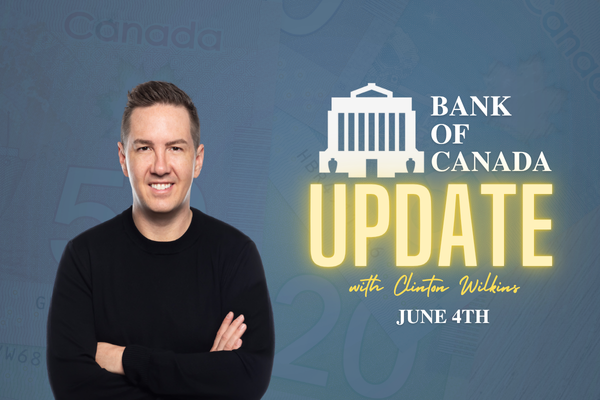Clinton Wilkins joins Todd Veinotte on 95.7 News Radio to discuss The Bank of Canada holding its key policy rate at 2.75%, marking the first pause after seven consecutive cuts.
CTV Live at 5: Bank of Canada rate increase
Clinton talks with Bruce Frisko, from CTV, to discuss the Bank of Canada rate increase.
Don’t feel like watching? Check out the video transcript below.
Transcript:
Going up
Jayson: [00:00:00] First at five tonight, going up, that’s the direction of the Bank of Canada’s trendsetting interest rate is headed, with a quarter point increase announced earlier today.
Marie: [00:00:08] That brings the benchmark to 1.75 percent and CTV’s Bruce Frisko tells us it’s a number that will be felt by many Canadians. Bruce.
Bruce: [00:00:18] It sure will Marie. In fact anybody with an unsecured line of credit or particularly one of those variable rate mortgages. In fact a typical mortgage holder is now paying about 200 dollars a month more than they were just two years ago. And experts say that those changes may in fact keep some people from ever owning a home.
Anne: [00:00:40] Good morning! Centum Home Lenders, how may I help you?
New rate hikes
Bruce: [00:00:42] It’s a scene playing out in mortgage offices across the country as Canadians try to figure out what the latest hike is going to cost them. In fact when the governor of the Bank of Canada makes an announcement about its benchmark rate it’s all hands on deck for Clinton Wilkins who now admits some borrowers may be more comfortable locking into a fixed rate.
Clinton: [00:01:08] Prior to this, the last four increases we were really telling people to hold the line. And now, I think that there is a decision to be made in everyone’s household, you know what’s the best fit going forward.
Stephen: [00:01:18] I get it, It can be difficult for some but the reality is that the economy is running at its capacity.
Bruce: [00:01:26] In raising rates for the fifth time in two years. The BOC governor says the central bank is simply adjusting the rate to bring it back to some semblance of normal.
Normalization in the economy
Stephen: [00:01:36] So basically what we’re talking about is the last element of that normalization process, “getting home” as we described it.
Bruce: [00:01:44] For a typical mortgage holder the change represents about 35 extra dollars a month. Not the end of the world for engineer Jason Angel.
Jason: [00:01:53] It probably won’t affect me but I do have colleagues and friends that they would be affected because forty dollars here, forty dollars there, adds up.
Shane: [00:01:59] It all comes down to the formula.
Bruce: [00:02:01] Realtor Shane Anderson says the Halifax market remains solid but that few extra dollars may be enough to shut some first time buyers out completely.
What about first time home buyers?
Shane: [00:02:11] If you’re a first time homebuyer, and you’re right on that cusp of being able to afford the mortgage and qualify for the mortgage. It really can make a difference in you getting that mortgage not for your first home.
Clinton: [00:02:22] So it’s definitely going to negatively impact Canadians today and it’s going to impact people here in Atlantic Canada.
Anne: [00:02:28] Nothing today but looks like tomorrow afternoon at 4:30.
Questions to answer
Bruce: [00:02:32] So, the calls keep coming. For the time being all hands on deck for people in the mortgage business. Who’ve got a lot of questions to answer in the days ahead. And, you know, a new survey released just yesterday suggested 44 percent of respondents said they are within 200 dollars of insolvency every month. And another 27 percent said they have absolutely nothing left over after the time they pay the bill. So, of course, that extra 35, 40 bucks is significant to a lot of people out there. Maria and J.
Marie: [00:03:08] Now it sure is. Thanks so much. CTV’s Bruce fresco reporting live for us in Halifax.
If you have any more questions about your mortgage, please get in touch with us here!


